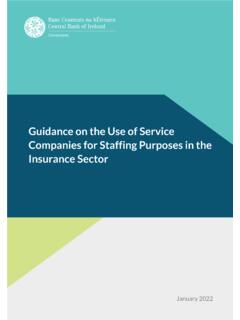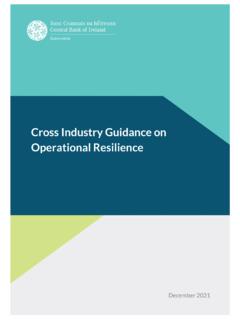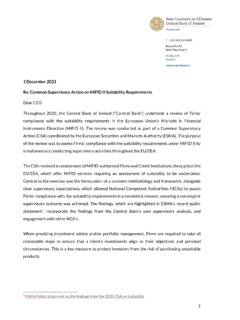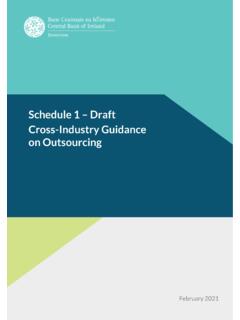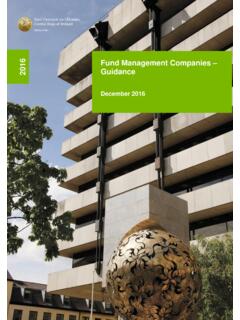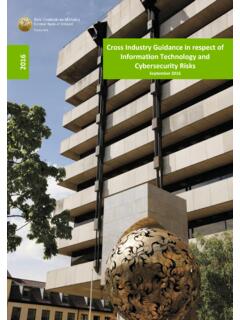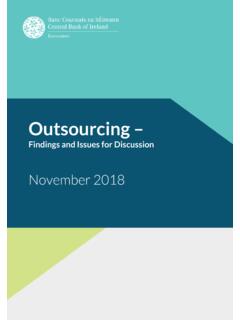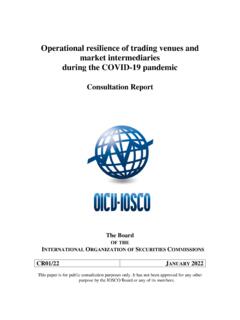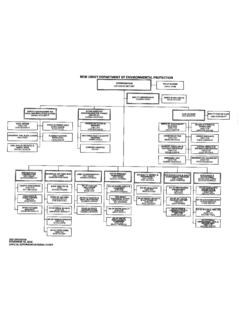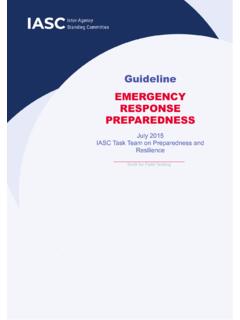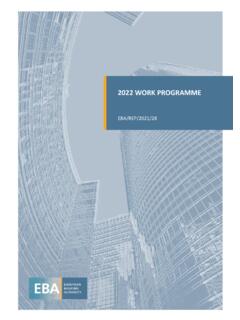Transcription of Cross-Industry Guidance on Outsourcing
1 T: +353 (0)1 224 6000 E: Cross-Industry Guidance on Outsourcing December 2021 Cross-Industry Guidance on Outsourcing December 2021 Central Bank of Ireland Page 2 Contents Part A - Introduction .. 4 1. Background .. 4 2. Context .. 6 3. Purpose & Scope .. 8 4. Application of the Guidance and 10 5. Status .. 10 Part B - .. 11 Cross-Industry Guidance on Outsourcing Risk .. 11 1. Assessment of Criticality or Importance of activity/service to be outsourced .. 11 2. Intragroup Arrangements .. 13 3. Outsourcing & Delegation .. 14 4. Governance .. 15 The role of the board and senior management .. 15 Strategy and Policy for Outsourcing .. 16 Record Keeping (Documentation Requirements - Register/s) .. 19 Outsourcing of Risk Management and Internal Control Functions19 5. Outsourcing Risk Assessment & Management .. 20 Sub- Outsourcing Risk .. 22 Sensitive Data Risk.
2 23 Data Security Availability and Integrity .. 25 Concentration Risk .. 26 Offshoring Risk .. 28 6. Due Diligence .. 30 Values and Ethical Behaviour Regulatory Expectations .. 32 Frequency of Due Diligence Review Performance .. 32 7. Contractual Arrangements and Service Level Agreements (SLAs) .. 32 General Requirements .. 33 Termination Rights .. 36 Access, Information and Audit Rights .. 37 Cross-Industry Guidance on Outsourcing December 2021 Central Bank of Ireland Page 3 Review of Agreements .. 37 Non-Critical or Important Outsourcing Arrangements .. 37 8. Ongoing Monitoring and Challenge .. 38 Monitoring of Outsourcing arrangements .. 38 Internal Audit & Independent Third Party Review .. 39 Use of Third Party Certifications and Pooled Audits .. 40 9. Disaster Recovery and Business Continuity Management .. 41 Exit Strategies .. 43 10. Provision of Outsourcing Information to the Central Bank of Ireland.
3 45 Notifications & Reporting .. 46 Maintenance and Submission of Registers .. 50 Appendix 1 - Existing Sectoral Legislation, Regulations and Guidance .. 54 Appendix 2 - Definitions and Criteria for Critical or Important Functions .. 56 General Note: .. 56 Appendix 3 - Sample for Guidance on Content and Completion of Register/Database and CBI Regulatory Return .. 65 Appendix 4 - Definitions .. 70 Cross-Industry Guidance on Outsourcing December 2021 Central Bank of Ireland Page 4 Part A - Introduction 1. Background The Strategic Plan of the Central Bank of Ireland ( the Central Bank ) sets out its Mission, Vision and Mandate. The Mission of the Central Bank is to serve the public interest by safeguarding monetary and financial stability and by working to ensure that the financial system operates in the best interests of consumers and the wider economy. In discharging its functions and exercising its powers, the Central Bank s mandate incorporates a number of statutory objectives.
4 The Cross Industry Guidance on Outsourcing ( the Guidance ) set out herein, is published in the context of a number of these objectives, particularly1: Contributing to the stability of the financial system; The proper and effective regulation of financial service providers and markets, while ensuring that the best interests of consumers of financial services are protected; and The resolution of financial difficulties in credit institutions, certain investment firms and credit unions. The Central Bank has also prioritised five strategic themes, which have been identified as being critical to the successful delivery of its mandate. The themes of Strengthening Resilience so that the financial system is better able to withstand external shocks and future crises; and Strengthening Consumer Protection so that the best interests of consumers are protected and confidence and trust in the financial system is enhanced through effective regulation of firms and markets, are of particular relevance to the publication of this Guidance .
5 The Central Bank is strongly focused on Outsourcing due to its increasing prevalence across the financial services sector and its potential, if not effectively managed, to threaten the operational resilience of financial service providers regulated by the Central Bank ( regulated firms ) and the Irish financial system. This would undermine the attainment of some of the key statutory objectives, which the Central Bank is mandated to achieve. Robust and effective Outsourcing risk management within regulated firms supports the financial and operational resilience of these firms and consequently facilitates financial stability aims. 1 The new Central Bank s Strategic Plan 2022-2024 is effective from January 2022, this publication is aligned to theme of Safeguarding . The strategy can be found here: Cross-Industry Guidance on Outsourcing December 2021 Central Bank of Ireland Page 5 In recent years, the Central Bank has undertaken a significant programme of work in relation to outsourcing2 and the management by regulated firms of risks presented by Outsourcing arrangements.
6 This programme of work has included: A Cross Sector Survey of Regulated Firms Outsourcing Activity , which issued to 185 regulated firms in 2017; The publication of the discussion paper Outsourcing Findings and Issues for Discussion 3 in November 2018; The hosting of an industry Outsourcing Conference in April 2019; and Ongoing Outsourcing related supervisory engagements, including risk assessments, inspections and thematic reviews. During the conduct of this programme of work, the European Banking Authority ( the EBA ) updated the 2006 guidelines on Outsourcing that were issued by the Committee of European Banking Supervisors (CEBS). The updated guidelines on Outsourcing , EBA/GL/2019/02, were published in February 2019 and came into force in September 2019. These guidelines also incorporated the EBA s 2017 recommendations on Outsourcing to cloud service providers (CSPs). The aim of the EBA Guidelines is to establish a more harmonised framework for all financial institutions that are within the scope of the EBA s mandate, namely credit institutions and investment firms subject to the Capital Requirements Directive (CRD), as well as payment and electronic money institutions 4.
7 2019 and 2020 also saw the publication of the following: EBA Guidelines on ICT and security risk management (EBA ICT Guidelines); European Insurance and Occupational Pensions Authority (EIOPA) Guidelines on Outsourcing to cloud service providers (EIOPA-BoS-20-002); International Organization of Securities Commissions (IOSCO) Principles on Outsourcing 2021; European Securities and Markets Authority ESMA 50-157-2403 Guidelines on Outsourcing to Cloud Service Providers December 2020. EIOPA Guidelines on ICT Security and Governance BoS-20/600 The Central Bank views the management of Outsourcing risk as key from both a Prudential and Conduct perspective. Boards and senior management must be cognisant of the fact that when entering into Outsourcing arrangements they are creating a dependency on a third party, which has 2 The general term Outsourcing is used in this paper in place of other terms, which may be used in specific sectors delegation.
8 3 4 Cross-Industry Guidance on Outsourcing December 2021 Central Bank of Ireland Page 6 the potential to influence the operational resilience of their firm. The COVID 19 pandemic in 2020 has emphasised the need for resilience in the operation of Outsourcing arrangements and reinforces the need for effective governance and oversight of the arrangements. Regulated firms are expected to have effective governance, risk management and business continuity processes in place in relation to Outsourcing , to mitigate potential risks of financial instability and consumer detriment. The Guidance set out herein is designed to assist regulated firms in developing their Outsourcing risk management frameworks to effectively identify, monitor and manage their Outsourcing risks. The Central Bank s supervisory framework will apply a risk-based approach to assess the effectiveness of regulated firms governance and management of Outsourcing arrangements and their adherence to and implementation of this Guidance .
9 Terms Commonly Used in the Guidance - Definitions There are a number of terms and acronyms referring to aspects of Outsourcing , which are used throughout this Guidance . The definitions for these terms are contained in Appendix 4 at the rear of this document. 2. Context The nature of the financial services landscape is continually changing. Change is being influenced by many factors including customer/client preferences, regulatory concerns, the increased pace of technological innovation in the delivery of services, and changes in business models driven by cost, profitability and the need for increased flexibility and agility. Outsourcing is at the heart of much of this change and is increasingly being adopted as a key strategic tool to enable regulated firms to manage these changes. The Central Bank recognises the increasing reliance of many regulated firms on outsourced service providers (OSPs). This includes the use of both intragroup entities and third party OSPs, both regulated and unregulated, for the provision of activities and services considered central to the successful delivery of regulated firms strategic objectives.
10 Furthermore, given the continually changing landscape for the provision of financial services and the adaptation of regulated firms in responding to this change the Central Bank anticipates that there will be new structures and business models devised and created to deliver critical and important services. The Central Bank is already seeing some of these transformative capabilities emerging, which will be increasingly controlled by services providers who sit outside the traditional boundaries of the regulated financial services industry. This is leading to the creation of new service delivery models such as strategic partnering, Cross-Industry shared service centres, staff sharing and extensive sub- Outsourcing , The development and use of these new models to deliver critical and important services or functions by regulated firms will be regarded as Outsourcing and regulated firms will be expected to apply this Guidance .
